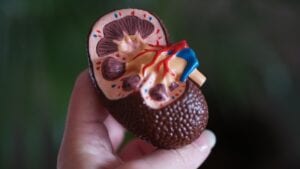Wilms’ Tumor
What is Wilms’ tumor?
Wilms’ tumor is a rare form of childhood kidney cancer that is also referred to as nephroblastoma. Children between the ages of three and four are at the highest risk of this disease, with the risk dropping dramatically after a child turns five.
What are the symptoms of Wilms’ tumor?
Common symptoms of this tumor include a mass in the abdomen that you can feel, pain in the abdomen, and swelling in the abdomen. However, not all affected individuals experience the same symptoms. Other possible effects include:
- Constipation
- High blood pressure
- Fever
- Loss of appetite
- Blood in the urine
- Nausea
- Vomiting
- Shortness of breath
What causes Wilms’ tumor?
Doctors are unsure as to what exactly causes this form of cancer. They suspect that genetics may play a role, but in most cases there is no connection between parent and child when it comes to the disease.
Medical professionals have discovered a number of risk factors, however. They know that a family history of Wilms’ tumor places one at an increased risk. They have also discovered that African-American children are at a higher risk of developing this cancer, whereas Asian-American children are at a lower risk. If a child is born with aniridia or hemihypertrophy, or a rare disease like Denys-Drash syndrome, WAGR syndrome, or Beckwith-Wiedmann syndrome, they are also at a higher risk of developing this cancer.
How is Wilms’ tumor diagnosed?
A doctor will begin with a physical examination followed by imaging tests, blood tests, and urine tests. Further tests, such as X-rays or CT scans of the chest, may be necessary to stage the cancer after it has been diagnosed.
What are the treatments for Wilms’ tumor?
Surgery is typically the first step in the treatment of Wilms’ tumor. Doctors may remove part of the kidney, the entire organ and surrounding tissue, or all or or part of both kidneys depending on the stage of the cancer. Chemotherapy is typically used as well; it can be administered both before and after surgery. Radiation therapy may also be recommended, but it is not as common as surgery or chemotherapy.
Where can I find out more about Wilms’ tumor?
Wilms' Tumor Articles





After Battling Wilms’ Tumor, Stephanie is Cancer-Free at Age 9







